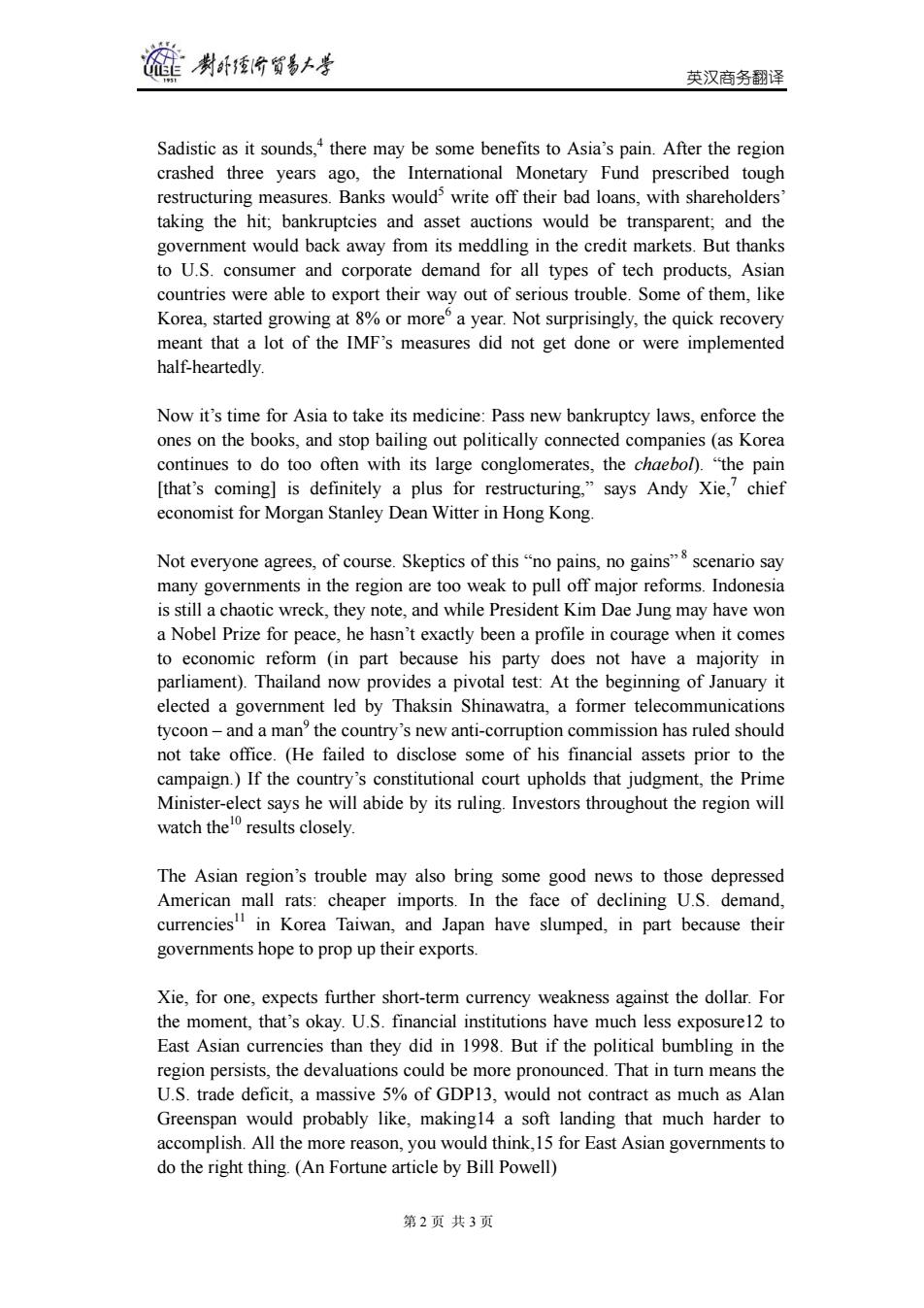正在加载图片...

制研价贸号卡考 英汉商务翻译 Sadistic as it sounds,4 there may be some benefits to Asia's pain.After the region crashed three years ago,the International Monetary Fund prescribed tough restructuring measures.Banks would>write off their bad loans,with shareholders' taking the hit;bankruptcies and asset auctions would be transparent;and the government would back away from its meddling in the credit markets.But thanks to U.S.consumer and corporate demand for all types of tech products,Asian countries were able to export their way out of serious trouble.Some of them,like Korea,started growing at 8%or more a year.Not surprisingly,the quick recovery meant that a lot of the IMF's measures did not get done or were implemented half-heartedly. Now it's time for Asia to take its medicine:Pass new bankruptcy laws,enforce the ones on the books,and stop bailing out politically connected companies (as Korea continues to do too often with its large conglomerates,the chaebol)."the pain [that's coming]is definitely a plus for restructuring,"says Andy Xie,'chief economist for Morgan Stanley Dean Witter in Hong Kong. Not everyone agrees,of course.Skeptics of this"no pains,no gains"scenario say many governments in the region are too weak to pull off major reforms.Indonesia is still a chaotic wreck,they note,and while President Kim Dae Jung may have won a Nobel Prize for peace,he hasn't exactly been a profile in courage when it comes to economic reform (in part because his party does not have a majority in parliament).Thailand now provides a pivotal test:At the beginning of January it elected a government led by Thaksin Shinawatra,a former telecommunications tycoon-and a man the country's new anti-corruption commission has ruled should not take office.(He failed to disclose some of his financial assets prior to the campaign.)If the country's constitutional court upholds that judgment,the Prime Minister-elect says he will abide by its ruling.Investors throughout the region will watch theresults closely. The Asian region's trouble may also bring some good news to those depressed American mall rats:cheaper imports.In the face of declining U.S.demand, currencies in Korea Taiwan,and Japan have slumped,in part because their governments hope to prop up their exports. Xie,for one,expects further short-term currency weakness against the dollar.For the moment,that's okay.U.S.financial institutions have much less exposure12 to East Asian currencies than they did in 1998.But if the political bumbling in the region persists,the devaluations could be more pronounced.That in turn means the U.S.trade deficit,a massive 5%of GDP13,would not contract as much as Alan Greenspan would probably like,making14 a soft landing that much harder to accomplish.All the more reason,you would think,15 for East Asian governments to do the right thing.(An Fortune article by Bill Powell) 第2页共3页英汉商务翻译 Sadistic as it sounds,4 there may be some benefits to Asia’s pain. After the region crashed three years ago, the International Monetary Fund prescribed tough restructuring measures. Banks would5 write off their bad loans, with shareholders’ taking the hit; bankruptcies and asset auctions would be transparent; and the government would back away from its meddling in the credit markets. But thanks to U.S. consumer and corporate demand for all types of tech products, Asian countries were able to export their way out of serious trouble. Some of them, like Korea, started growing at 8% or more6 a year. Not surprisingly, the quick recovery meant that a lot of the IMF’s measures did not get done or were implemented half-heartedly. Now it’s time for Asia to take its medicine: Pass new bankruptcy laws, enforce the ones on the books, and stop bailing out politically connected companies (as Korea continues to do too often with its large conglomerates, the chaebol). “the pain [that’s coming] is definitely a plus for restructuring,” says Andy Xie,7 chief economist for Morgan Stanley Dean Witter in Hong Kong. Not everyone agrees, of course. Skeptics of this “no pains, no gains” 8 scenario say many governments in the region are too weak to pull off major reforms. Indonesia is still a chaotic wreck, they note, and while President Kim Dae Jung may have won a Nobel Prize for peace, he hasn’t exactly been a profile in courage when it comes to economic reform (in part because his party does not have a majority in parliament). Thailand now provides a pivotal test: At the beginning of January it elected a government led by Thaksin Shinawatra, a former telecommunications tycoon – and a man9 the country’s new anti-corruption commission has ruled should not take office. (He failed to disclose some of his financial assets prior to the campaign.) If the country’s constitutional court upholds that judgment, the Prime Minister-elect says he will abide by its ruling. Investors throughout the region will watch the10 results closely. The Asian region’s trouble may also bring some good news to those depressed American mall rats: cheaper imports. In the face of declining U.S. demand, currencies11 in Korea Taiwan, and Japan have slumped, in part because their governments hope to prop up their exports. Xie, for one, expects further short-term currency weakness against the dollar. For the moment, that’s okay. U.S. financial institutions have much less exposure12 to East Asian currencies than they did in 1998. But if the political bumbling in the region persists, the devaluations could be more pronounced. That in turn means the U.S. trade deficit, a massive 5% of GDP13, would not contract as much as Alan Greenspan would probably like, making14 a soft landing that much harder to accomplish. All the more reason, you would think,15 for East Asian governments to do the right thing. (An Fortune article by Bill Powell) 第 2 页 共 3 页